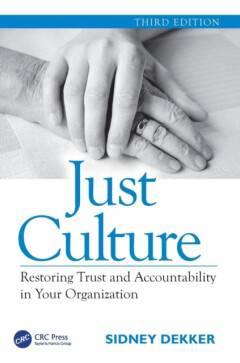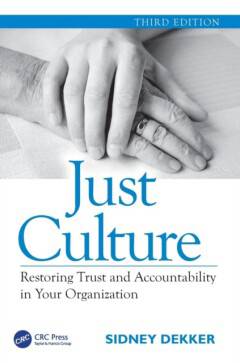
- Afhalen na 1 uur in een winkel met voorraad
- Gratis thuislevering in België vanaf € 30
- Ruim aanbod met 7 miljoen producten
- Afhalen na 1 uur in een winkel met voorraad
- Gratis thuislevering in België vanaf € 30
- Ruim aanbod met 7 miljoen producten
Zoeken
Just Culture
Restoring Trust and Accountability in Your Organization, Third Edition
Sidney Dekker
Paperback | Engels
€ 63,95
+ 127 punten
Uitvoering
Omschrijving
A just culture is a culture of trust, learning and accountability. It is particularly important when an incident has occurred; when something has gone wrong. How do you respond to the people involved? What do you do to minimize the negative impact, and maximize learning? This third edition of Sidney Dekker's extremely successful Just Culture offers new material on restorative justice and ideas about why your people may be breaking rules. Supported by extensive case material, you will learn about safety reporting and honest disclosure, about retributive just culture and about the criminalization of human error. Some suspect a just culture means letting people off the hook. Yet they believe they need to remain able to hold people accountable for undesirable performance. In this new edition, Dekker asks you to look at 'accountability' in different ways. One is by asking which rule was broken, who did it, whether that behavior crossed some line, and what the appropriate consequences should be. In this retributive sense, an 'account' is something you get people to pay, or settle. But who will draw that line? And is the process fair? Another way to approach accountability after an incident is to ask who was hurt. To ask what their needs are. And to explore whose obligation it is to meet those needs. People involved in causing the incident may well want to participate in meeting those needs. In this restorative sense, an 'account' is something you get people to tell, and others to listen to. Learn to look at accountability in different ways and your impact on restoring trust, learning and a sense of humanity in your organization could be enormous.
Specificaties
Betrokkenen
- Auteur(s):
- Uitgeverij:
Inhoud
- Aantal bladzijden:
- 164
- Taal:
- Engels
Eigenschappen
- Productcode (EAN):
- 9781472475787
- Verschijningsdatum:
- 24/10/2016
- Uitvoering:
- Paperback
- Formaat:
- Trade paperback (VS)
- Afmetingen:
- 155 mm x 234 mm
- Gewicht:
- 281 g

Alleen bij Standaard Boekhandel
+ 127 punten op je klantenkaart van Standaard Boekhandel
Beoordelingen
We publiceren alleen reviews die voldoen aan de voorwaarden voor reviews. Bekijk onze voorwaarden voor reviews.











